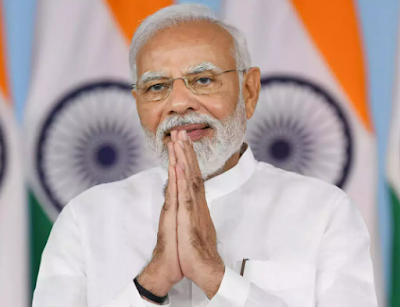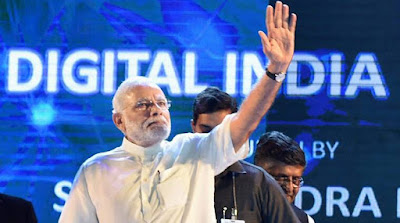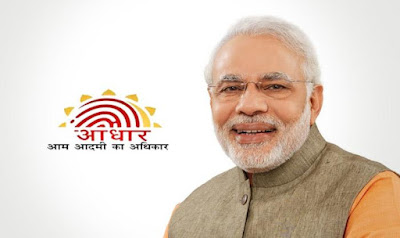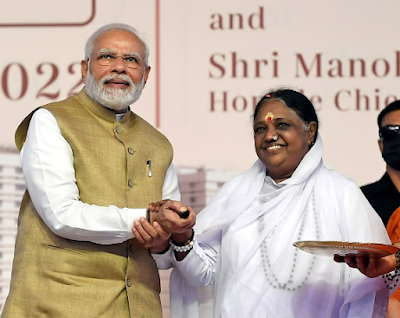Prime Minister Narendra Modi's Love for Technology: How it has Helped India Progress
India's Prime Minister Narendra Modi is known for his love and passion for technology, and it's not just because he tweets regularly or uses social media to connect with the masses. Modi's love for technology is deeply ingrained in his vision of transforming India into a digital superpower, and he has been working tirelessly to achieve this goal since he took office in 2014. Since 2014, Modi has emphasized the importance of technology in the country's development and has made significant efforts to bring technology to the forefront of India's growth story. In this article, we'll explore the ways in which Modi's love for technology has helped India progress.
Modi's Background in Technology
Modi's focus on technology began long before he became prime minister. Before becoming Prime Minister, Modi served as the Chief Minister of Gujarat, where he implemented several technology-based initiatives. He was one of the first Indian politicians to use social media as a means of communication with his constituents. He also created a network of free Wi-Fi hotspots across Gujarat and introduced an e-governance system that allowed citizens to access government services online.
As the chief minister of Gujarat, he was an early adopter of technology in governance, using digital tools to improve government services and increase transparency. He was also instrumental in setting up the Gujarat State Wide Area Network (GSWAN), which connected all government offices in the state and enabled the delivery of e-governance services.
Modi's focus on technology continued when he became Prime Minister and he brought his love for technology to the national stage. He launched several initiatives, including Digital India, Make in India, and Startup India, which aimed to promote technology-based innovation, entrepreneurship, and manufacturing in India. He also introduced Aadhaar, a unique identification system that uses biometric data to provide each Indian citizen with a unique identification number.
His first major initiative was the Digital India campaign, which aims to transform India into a digitally empowered society and knowledge economy. The campaign has several key objectives, including improving digital infrastructure, promoting digital literacy, and delivering digital services to every citizen.
Under Modi's leadership, India has made significant progress in achieving these objectives. The government has launched several ambitious initiatives, such as the National Optical Fiber Network (NOFN), which aims to connect all 250,000 gram panchayats (village councils) in the country with high-speed broadband by 2022. The government has also launched the BharatNet project, which aims to provide broadband connectivity to all households in the country.
Modi has also been a strong advocate of using technology to improve governance and deliver public services. The government has launched several digital platforms, such as MyGov and e-NAM, to enable citizens to participate in governance. India has made great strides in recent years in terms of technological advancements, and much of this progress can be attributed to the leadership of Prime Minister Narendra Modi. Modi has long been a proponent of technology and has implemented a number of initiatives and policies aimed at boosting India's tech industry and driving innovation.
Modi's Push for Digital Payments
Modi has been a vocal advocate for digital payments and has encouraged the use of digital payment methods in India. In 2016, he launched the demonetization drive, which aimed to remove high-value banknotes from circulation and promote digital payments. While the move was controversial, it helped to push the country towards a cashless economy and increased the adoption of digital payment methods in India.
Modi also launched the BHIM (Bharat Interface for Money) app, a mobile payment app that allows users to make digital payments directly from their bank accounts. The app has been widely adopted in India.
Modi's government has also implemented a number of initiatives aimed at promoting digital payments and reducing the country's reliance on cash. The Unified Payments Interface (UPI) system, which was launched in 2016, has made it easier for people to make and receive payments electronically, while the Bharat Interface for Money (BHIM) app has provided a simple, user-friendly platform for mobile payments.
Modi's Technology Initiatives
One of Modi's most significant tech-related initiatives has been his Digital India campaign, which seeks to expand the reach of digital technology across the country and provide greater access to digital services to all Indians. The campaign has focused on areas such as broadband connectivity, digital infrastructure, and e-governance, and has helped to bridge the digital divide between urban and rural areas of India.
Another major area of focus for Modi has been startup entrepreneurship. He has implemented a number of policies and initiatives aimed at promoting startup culture in India, such as the Startup India program, which provides support and funding for new startups. As a result, India has seen a surge in tech startups in recent years, with the country now home to a thriving startup ecosystem that is helping to drive innovation and create jobs.
Modi has also been a strong advocate for the use of technology in improving governance and public services. His government has implemented a number of e-governance initiatives, such as the MyGov portal, which provides citizens with a platform to engage with the government and provide feedback on policies and initiatives. Additionally, Modi has launched several mobile apps aimed at improving access to public services, such as the BHIM app for mobile payments and the UMANG app for accessing government services.
One of Modi's most significant technical achievements has been the implementation of the Aadhaar biometric identification system, which has helped to streamline government services and reduce fraud. The system assigns a unique 12-digit number to each citizen, based on their biometric and demographic data, which can be used to access a range of services, including banking, welfare benefits, and tax returns.
In addition to these initiatives, Modi has also promoted the use of technology in improving healthcare in India. The National Health Stack, which was launched in 2018, is a comprehensive platform for the collection and analysis of healthcare data, which aims to improve the delivery of healthcare services and reduce costs. The government has also launched the eSanjeevani telemedicine platform, which allows patients to consult with doctors remotely, reducing the need for in-person visits and improving access to healthcare services.
Modi has also been a strong advocate for the use of technology in education. He believes that technology can enhance the quality and accessibility of education for all students, especially those in rural and remote areas. He has launched several initiatives to promote digital literacy, online learning, and innovation in education. Some of these include the National Digital Library, SWAYAM (Study Webs of Active Learning for Young Aspiring Minds), DIKSHA (Digital Infrastructure for Knowledge Sharing), and Atal Tinkering Labs. Modi has also encouraged the use of artificial intelligence, blockchain, and cloud computing in education to create a future-ready workforce.
Modi's love for technology has played a significant role in helping India progress in recent years. By investing in digital infrastructure, promoting startup culture, and using technology to improve governance and public services, Modi has helped to drive innovation and economic growth, positioning India as a leader in the global tech industry.
Narendra Modi, the Prime Minister of India, will always be known for his love for technology and his vision of a digital India, for the generations to come. He believes that technology can make governance more transparent, efficient and responsive to the needs of the people. He is an avid user of technology himself and has a strong presence on social media platforms such as Facebook, Twitter, LinkedIn and Instagram. Narendra Modi's love for technology has made him popular among the youth and has inspired many start-up entrepreneurs and innovators in India. We congratulate him for all the good work he has done for the country and its people.















No comments: